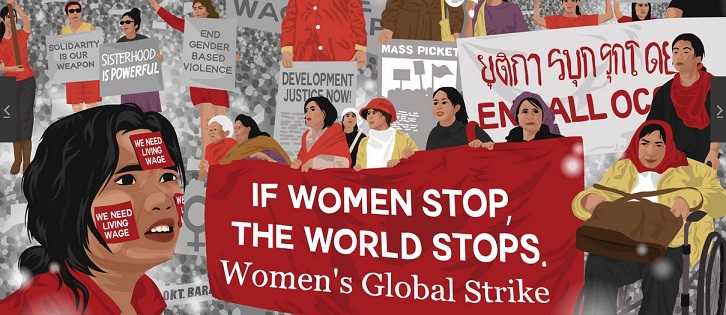“Our collective power and feminist solidarity are our hope and answer to fight patriarchy, fundamentalisms, capitalism and militarism. And that’s why we are calling for a Women’s Global Strike on International Women’s Day next year!”
By MARYA SALAMAT
Bulatlat.com
MANILA – In Valenzuela City, the 10th most populous city in the Philippines and site of the worst factory fire in recent history, women workers receive wages lower than their male counterparts on the same job. Both are receiving below-minimum wage rates, Malou Santos, chairperson of Women Wise (Women Workers in Struggle for Employment, Empowerment and Emancipation), told Bulatlat in an interview.
Elsewhere in the Philippines, the problem of low wages was raised even more strenuously on May 1 Labor Day celebrations, when the government traditionally tries to give new packages of wage hike or cost of living adjustments and other benefits to workers. But this May 1 and in previous years under President Rodrigo Duterte, the wage rates have been adjusted so little that its purchasing power has actually shrunk despite the increases, according to Ibon research.
The result is that the reality for majority of Filipino working women remains appalling despite the government boasts of improvement in women’s economic participation and opportunity, the Center for Women Resources (CWR) said in its Labor Day statement. The Philippines ranked 8th in the Global Gender Gap Index in 2018. But the realities on the ground for most women belie the government boast. CWR said that to this day, “women are still confronted with very limited work opportunities and are mostly confined as wage and salary workers in manufacturing and retail trade,” in non-regular and low-wage jobs that also are deemed as extensions of women’s domestic chores.
If there were any improvements, it happened because workers, including women workers, have organized themselves and launched concerted actions, the CWR noted. In the Philippines, the likes of the women workers of NutriAsia in Marilao, Bulacan and Sumitomo Fruit Corp (Sumifru) in Compostela Valley have drawn attention and public support when they launched strikes to expose and change their sorry working conditions. Their struggle continues, but women’s advocates drew hope that the plight of working women will soon change for the better if women continue on working collectively in asserting and defending their rights.
A call for Global Women’s Strike, March 8, 2020
Last May 1, a network of feminists, women’s groups and social justice movements in various countries, raised the call for a just, fair and equitable world.
In a statement sent to the media by the Asia Pacific Forum on Women, Law and Development (APWLD), a Thailand-based network of feminist organizations and grassroots activists in Asia Pacific, they reiterated that an equitable world for women includes, among others, a living wage, food sovereignty for all communities, women’s access and control over resources and livelihoods, and certainly no gender wage gap nor gender-based violence.
The APWLD’s network in the Philippines include the CWR, Gabriela, Center for Trade Union and Human Rights, peasant group Amihan, and the Center for Environmental Concerns.
Globally, women earn 37 percent less than men and at the current rate of progress, it will take 202 years to close the gap, the APWLD said.
“In developing countries, two thirds of women are in the informal economy where they are less likely to have legal rights or social protection, and are often not paid enough to enable them to escape poverty. We cannot continue like this anymore,” said Daisy Arago, Center for Trade Union and Human Rights (CTUHR), Philippines.
The current state of development is market-driven and emphasizes individualism, profits, privatization of public services, while protecting corporations through tax breaks, concessions and loans, the APWLD said.
“This system is sustained by lowly paid women who are systematically exploited to maximize profits, spend significant time in unpaid care work, and are excluded from political, social and economic decision making,” said Burnad Fatima, Tamil Nadu Women’s Federation, India.
She urged women’s groups to strongly oppose land grabs by corporations that deprive rural women of livelihoods.
“We want to strike globally to stop the economic exploitation of women,” Fatima declared.
The Global Women’s Strike is slated to happen on March 8, International Working Women’s Day, next year (2020).
Women’s labor rights are rooted in the history of International Women’s Day and women’s struggle to participate in society on an equal footing with men. Misun Woo, director of Asia Pacific Forum on Women, Law and Development, said “We are living in a dangerous world where feminism or women’s human rights are depoliticized and pink-washed by promoting terms such as women’s economic empowerment, or even feminist foreign policy.”
She warned that it is just political manipulation.
“Our collective power and feminist solidarity are our hope and answer to fight patriarchy, fundamentalisms, capitalism and militarism. And that’s why we are calling for a Women’s Global Strike on International Women’s Day next year!” Woo said.
This Labor Day, the women’s coalition also launched the website womensglobalstrike.com, the women and women’s advocates’ resource for information about the campaign, and how women can participate and take actions for the global strike.
The post Feminist groups call for a women’s strike appeared first on Bulatlat.


